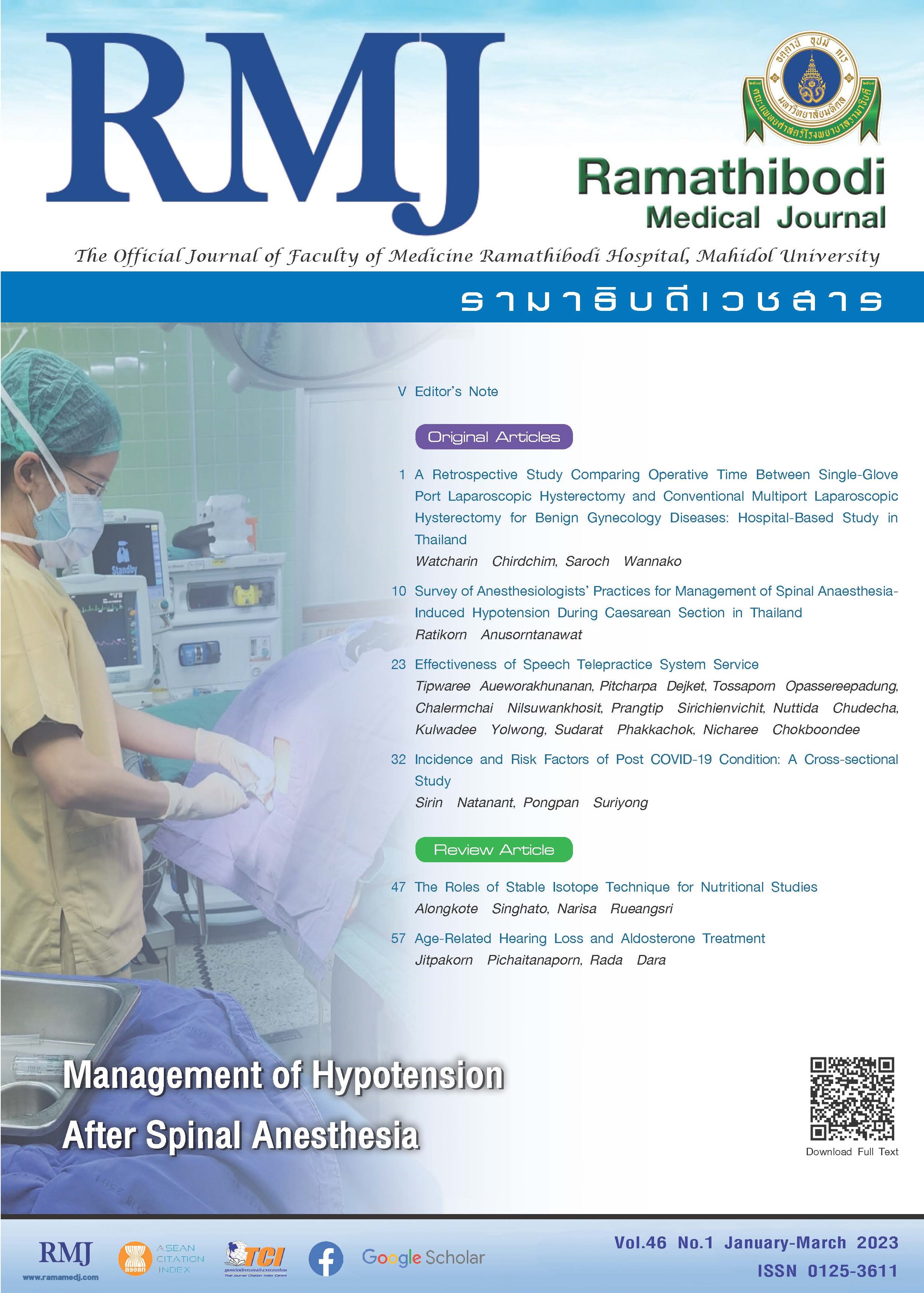Incidence and Risk Factors of Post COVID-19 Condition: A Cross-sectional Study
DOI:
https://doi.org/10.33165/rmj.2023.46.1.260117Keywords:
Post COVID-19, Incidence, Risk factor, Community pharmacist roleAbstract
Background: Coronavirus 2019 (COVID-19) infection has caused the survivors to be affected by post COVID-19 conditions in both short- and long-term periods.
Objectives: To determine the incidence and related factors of post COVID-19 condition, and to explore the medication use in the treatment of post COVID-19.
Methods: This study was a cross-sectional study collecting data of 260 patients diagnosed with COVID-19, using random sampling method, between April 3, 2020, and May 31, 2022, from the administration database of Nong Mamong Hospital, Chai Nat, Thailand, and telephone interviews with patients. Data were analyzed using logistic regression.
Results: The study found a post COVID-19 incidence of 79.2% (206 cases). Females had 2.5 times higher chance of developing post COVID-19 than males (95% CI, 1.35 - 4.64, P < .05). Favipiravir, Andrographis paniculate, and COVID-19 vaccination were not associated with the development of post COVID-19 (P > .05). Among those post COVID-19 case, 49% (101 cases) used medications or vitamins to treat or relieve symptoms.
Conclusions: The vast majority of people infected with COVID-19 faced post COVID-19 symptoms, which were more common in females than males.
References
World Health Organization. Responding to community spread of COVID-19: interim guidance. March 7, 2020. Accessed September 22, 2022. https://apps.who.int/iris/handle/10665/331421
Pollard CA, Morran MP, Nestor-Kalinoski AL. The COVID-19 pandemic: a global health crisis. Physiol Genomics. 2020;52(11):549-557. doi:10.1152/physiolgenomics.00089.2020
World Health Organization. WHO Coronavirus (COVID-19) Dashboard. June 29, 2022. Accessed September 22, 2022. https://covid19.who.int
Montenegro P, Moral I, Puy A, et al. Prevalence of post COVID-19 condition in primary care: a cross sectional study. Int J Environ Res Public Health. 2022;19(3):1836. doi:10.3390/ijerph19031836
Nabavi N. Long covid: how to define it and how to manage it. BMJ. 2020;370:m3489. doi:10.1136/bmj.m3489
World Health Organization. A clinical case definition of post COVID-19 condition by a Delphi consensus. October 6, 2021. Accessed September 22, 2022. https://apps.who.int/iris/handle/10665/345824
Chen C, Haupert SR, Zimmermann L, Shi X, Fritsche LG, Mukherjee B. Global prevalence of post-coronavirus disease 2019 (COVID-19) condition or long COVID: a meta-analysis and systematic review. J Infect Dis. 2022;226(9):1593-1607. doi:10.1093/infdis/jiac136
Michelen M, Manoharan L, Elkheir N, et al. Characterising long COVID: a living systematic review. BMJ Glob Health. 2021;6(9):e005427. doi:10.1136/bmjgh-2021-005427
Malik P, Patel K, Pinto C, et al. Post-acute COVID-19 syndrome (PCS) and health-related quality of life (HRQoL)-a systematic review and meta-analysis. J Med Virol. 2022;94(1):253-262. doi:10.1002/jmv.27309
National Institute for Health and Care Excellence. NICE Guideline, No. 188: COVID-19 rapid guideline: managing the long-term effects of COVID-19. Published December 18, 2020. Updated November 11, 2021. Accessed September 22, 2022. https://www.nice.org.uk/guidance/ng188
Pantasri T. Expanded roles of community pharmacists in COVID-19: a scoping literature review. J Am Pharm Assoc (2003). 2022;62(3):649-657. doi:10.1016/j.japh.2021.12.013
Ahjel SW, Al-Jumaili AA. The Pharmacist’s missing role in the COVID-19 pandemic. Innov Pharm. 2020;11(2):10.24926/iip.v11i2.3249. doi:10.24926/iip.v11i2.3249
Elbeddini A, Wen CX, Tayefehchamani Y, To A. Mental health issues impacting pharmacists during COVID-19. J Pharm Policy Pract. 2020;13:46. doi:10.1186/s40545-020-00252-0
Daniel WW, Cross CL. Biostatistics: A Foundation for Analysis in the Health Sciences. 11th ed. John Wiley & Sons; 2018.
Wangchalabovorn M, Weerametachai S, Leesri T. Prevalence of post COVID-19 conditions in SARS-CoV-2 infected patients at 3-month telephone follow-up. Regional Health Promotion Center 9 Journal. 2022;16(1):265-284.
Nalbandian A, Sehgal K, Gupta A, et al. Post-acute COVID-19 syndrome. Nat Med. 2021;27(4):601-615. doi:10.1038/s41591-021-01283-z
Cui X, Wang P, Wei Z. Emergency use of COVID-19 vaccines recommended by the World Health Organization (WHO) as of June 2021. Drug Discov Ther. 2021;15(4):222-224. doi: 10.5582/ddt.2021.01064
Taquet M, Dercon Q, Luciano S, Geddes JR, Husain M, Harrison PJ. Incidence, co-occurrence, and evolution of long-COVID features: a 6-month retrospective cohort study of 273,618 survivors of COVID-19. PLoS Med. 2021;18(9):e1003773. doi:10.1371/journal.pmed.1003773
Herman B, Wong MC, Viwattanakulvanid P. Vaccination status, favipiravir, and micronutrient supplementation roles in post-COVID symptoms: a longitudinal study. PLoS One. 2022;17(7):e0271385. doi:10.1371/journal.pone.0271385
Fernández-de-Las-Peñas C, Ortega-Santiago R, Fuensalida-Novo S, Martín-Guerrero JD, Pellicer-Valero OJ, Torres-Macho J. Differences in long-COVID symptoms between vaccinated and non-vaccinated (BNT162b2 Vaccine) hospitalized COVID-19 survivors infected with the delta variant. Vaccines (Basel). 2022;10(9):1481. doi:10.3390/vaccines10091481
Maglietta G, Diodati F, Puntoni M, et al. Prognostic factors for post-COVID-19 syndrome: a systematic review and meta-analysis. J Clin Med. 2022;11(6):1541. doi:10.3390/jcm11061541
Fernández-de-Las-Peñas C, Martín-Guerrero JD, Pellicer-Valero ÓJ, et al. Female sex is a risk factor associated with long-term post-COVID related-symptoms but not with COVID-19 symptoms: the long-COVID-EXP-CM multicenter study. J Clin Med. 2022;11(2):413. doi:10.3390/jcm11020413
Subramanian A, Nirantharakumar K, Hughes S, et al. Symptoms and risk factors for long COVID in non-hospitalized adults. Nat Med. 2022;28(8):1706-1714. doi:10.1038/s41591-022-01909-w
Koss J, Bohnet-Joschko S. Social media mining of long-COVID self-medication reported by Reddit users: feasibility study to support drug repurposing. JMIR Form Res. 2022;6(10):e39582. doi:10.2196/39582
Downloads
Published
How to Cite
Issue
Section
License
Copyright (c) 2023 Ramathibodi Medical Journal

This work is licensed under a Creative Commons Attribution-NonCommercial-NoDerivatives 4.0 International License.

















